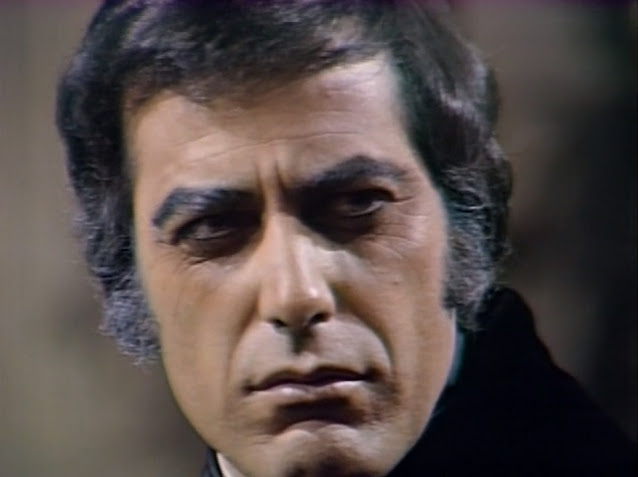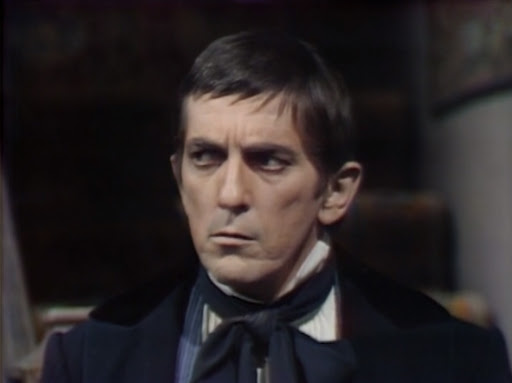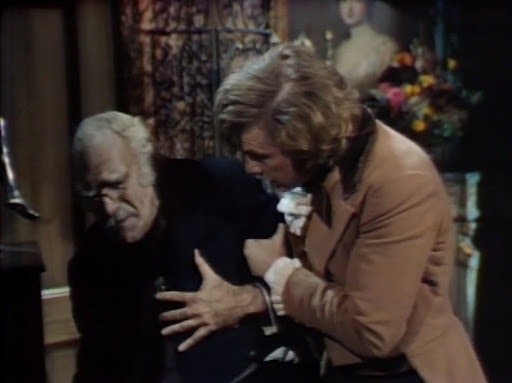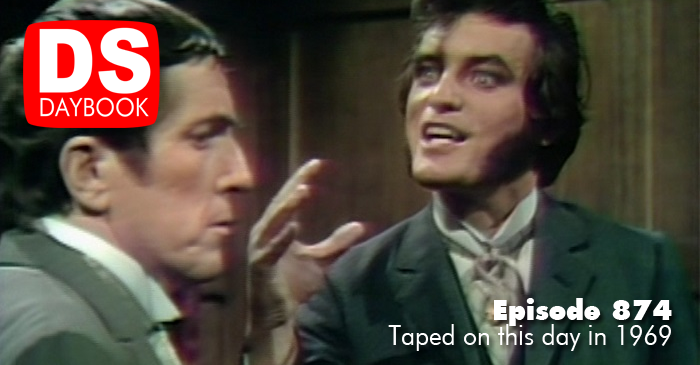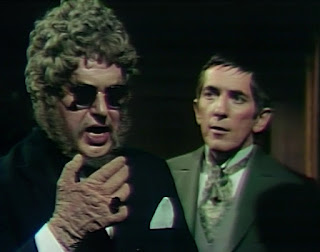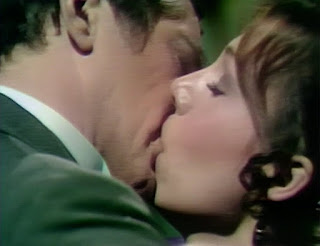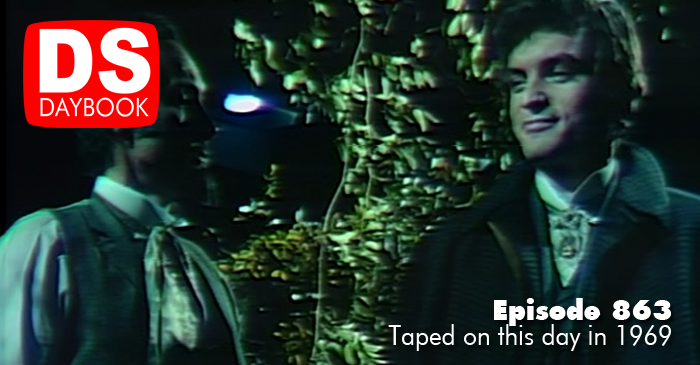Taped on this date in 1970: Episode 1124
By PATRICK McCRAY
Can Barnabas evade the son of the man he murdered before Judah Zachery claims another life? Lamar Trask: Jerry Lacy. (Repeat; 30 min.)
Armed with a letter disclosing the potential true identity of Barnabas Collins, Lamar visits Collinwood to force the brash Englishman’s hand. Meanwhile, at Rose Cottage, a man once possessed by the head of Judah Zachery confronts a haunted Desmond, dying in the process.
Maybe today isn’t the Dark Shadows Daybook. It might be the Trask House Daybook. Because I think we’ve stumbled into another series.
What a marvelous episode that charges out of the gate, giving us, just in the opening narration, an absolute banquet of intrigue, occult weirdness, and reasons to keep watching. The episode absolutely delivers, with actors like John Karlen and Nancy Barrett still finding new colors in their performances and a script that has genuine intrigue and dread. If you've seen the rest of the series, parts of it may feel familiar. And? Bolero quickly familiarizes us with itself, and that’s the point. It’s a burgeoning experience that intentionally maintains a simplicity that reveals a mounting complexity and grandeur, each go-round surprising us with what it contained all along. Yes, Bolero. But with Donna Wandrey instead of Bo Derek, and that's a pretty good trade. After all, Donna Wandrey never said, “They’re washing me like a horse,” while expecting to be taken seriously in subsequent features. Only Thayer David could pull that off.
Even though it’s at the start of the much maligned 1840 storyline, this is a solidly rambunctious way to introduce someone to the series. When it begins, Desmond is possessed by a haunted head, Quentin has drawn the Death card in a tarot deck, we find out that Kate Jackson is there to murder Quentin, and Barnabas is doing everything he can to win the current woman of his dreams away from, well, himself. He's always had to live down his nocturnal activities, but this is the most extreme case yet, as he tries to make up for the cad he was just a few days and yet hundreds of years ago. Kind of. Compounded. That's really before any dialogue starts. What a welcome to Collinwood! Considering what people have to wade through in the first episodes of the show just to get to the whole vampire part, this is like pressing the accelerator on a MacLaren. And then you kill off Abe Vigoda. Nothing against Abe, but if it worked for Coppola, it can work for Curtis. Abe, it’s just business.However, wedged in between that terrific opening and a climax where supernatural forces victimize Vigoda (and feel free to go back and read that phrase as many times as you want), we are actually stepping into a parallel universe. Well, kind of, and more interestingly than we ever did with parallel time. Because for just a moment, we step into the sister series of Dark Shadows. It’s the series that never got made, but the series that makes all the sense in the world. Its star? Jerry Lacy.
Is he the villain? Yeah, if you’re a Collins. But that’s a particularly pretzeled moral bar. Take a step back. Get an objective view of the ethical landscape that mercifully vanishes at Widow’s Hill. We take a degree of heroism for granted on the show because vampires are cool and we like Jonathan Frid. It’s easy to forget that these are pretty reprehensible people. Is there an alternative? Maybe for a blip in 1840: The House of Trask. For a period, they are the other white meat of prominent Collinsport families. Yes, they are working class, and yes they haven't been there as long, and no, they don't stay as long, but they nevertheless have a place. And you could very easily make a multi-generational supernatural tv series just based on that dynasty.
One of the things that brings this into focus on this is the stunning performance of Jerry Lacy, an actor so good that we take him for granted. It can be a curse of good actors because they make it look so effortless. In 1124, Lacy could easily win a bet on who the dashing and dark romantic lead really is. He is just as intense, unpredictable, and determined as any vampire. And perhaps as commandingly seductive. When he is alone with the women in the episode, he summons up a surprisingly deep well of passionate intensity. Yes, judgmental, but not without a powerful sense of desire. As he draws Letitia Faye into using her psychic abilities for his own ends, he shows a new and powerful side to the Trask archetype. For once, nothing is forbidden to him by the cloth. Poor Barnabas only comes back into the drawing room to save his own keister, seconds from being outed. With Lacy in brief control of the drama, Jonathan Frid plays the weasel pedal to an extent that even outshines the best of John Karlen. As hard as he possibly can. It's a delight, and he continues when he gets back home. Like a cartoon character, Trask has let himself in there, also, and is so calm and collected, I am surprised he’s not smoking Barnabas’ pipe and correcting his crossword puzzle.
Briefly, Trask the hero of a different show who has somehow wandered into a program where the victors of history have written him and his family as the bad guys. His father was a badass witch hunter, reportedly tortured and starved to death when he dared to pursue the servants, lovers, and associates of a vengeful and aristocratic vampire. He never knew the old man, but he certainly knows of his legend and suffered his absence. Fascinated with the strange dance of life and death, unable to afford medical school, Lamar Trask has clearly studied voraciously. He’s well-versed in the law, of course. An historic trial cost his father his future. Even in 1840, the only way to learn about bodies and anatomy, short of becoming a music hall entertainer, was to become a mortician. Makes you think. Maybe he didn’t get into that line because he's creepy. He might have followed that pursuit for entirely logical reasons. The Collins family is a menace! Look at the Collinses that he has to deal with. There's Gabriel, who is not exactly the life of the party. Then you have Quentin and Desmond, who have the incredibly poor judgment to do things like build unguarded, unstable time portals, become best friends with Gerard Stiles, and consider the severed head of a nefarious occultist to be a great gift for mom.The whole town loses either way, there. If you think it’s the perfect gift, you’re a danger to the entire town. If Flora is so nutty that it IS the perfect gift, you’re a danger to the entire Western Hemisphere. As a warmup. Yeah, these are the normative characters. These are the people we are supposed to trust. Topping it, Trask has a letter from his father absolutely outing what went on shortly before his mysterious death, doing so with eerie specificity. And who shows up? The “identical son" of his father 's killer, wielding ungodly social power and wealth. A man who potentially. has the powers of hell at his fingertips. And he’s suddenly on a first-name basis with your former Lois Lane.
Bolero again. But not just ascending. By this point, it’s inverting and twisting like trapeze artist determined to see how far their bravery and recklessness can take their art. In 1840, the show is still in midair, and maybe that’s where it remained. Of course, the eventual fact that Lamar is a ruthless and unethical bigot has to crash the party, taking Dark Shadows back to reality, which is not only where it belongs, but what it defines.
This episode was broadcast Oct. 15, 1970.

